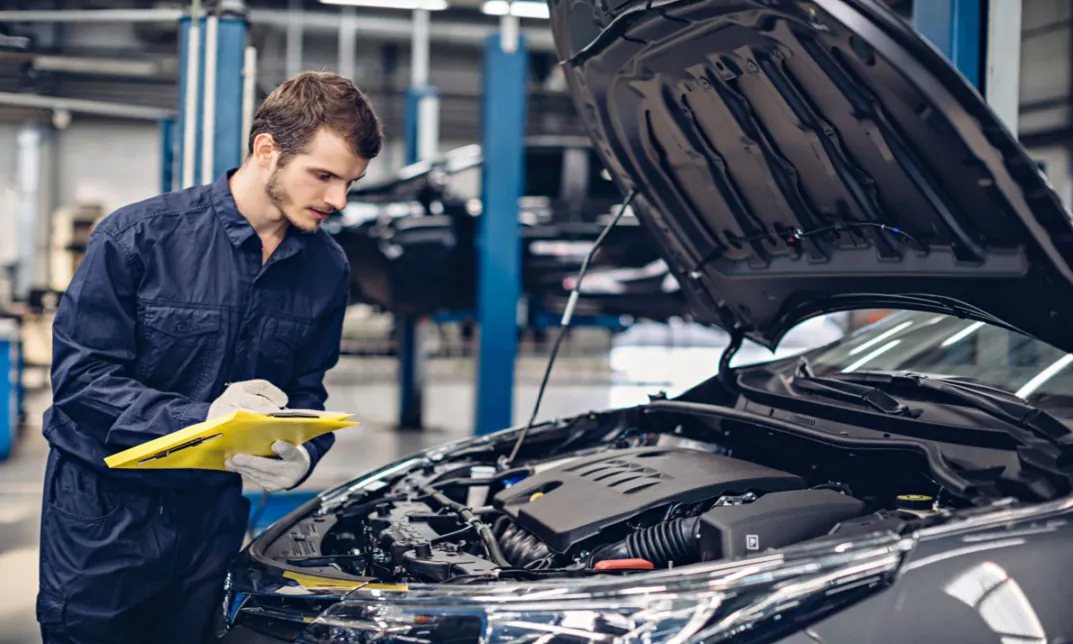No products in the basket.
So, you wanna know how to become a car mechanic in the UK? Cool. Let’s get something straight off the bat — this job ain’t just about turning wrenches anymore. Sure, you’ll bust knuckles. You’ll get grease under your nails. But being a mechanic in 2025 is also about plugging into systems, decoding electrical faults, and reading data off a laptop.
You’ll need both hands-on skills and sharp thinking. It’s part grit, part tech wizardry. And if you’re someone who likes figuring stuff out and doesn’t mind getting a bit dirty? This career could seriously pay off.
It Ain’t Just Wrenches Anymore
Forget that old-school image of the grubby bloke in a dim garage, elbow-deep in engine grease. Today’s mechanic looks more like a tech specialist than a musclehead. You’re still doing the hard work, but now you’ve got software and sensors backing you up.
Modern cars are rolling computers. You’re not just fixing metal parts anymore. You’re diagnosing fault codes, updating software, and checking waveforms. You’re a mechanic technician, a car electrical mechanic, and a problem-solver all rolled into one.
Digital Tools, Not Just Spanners
You’ll hook your laptop to the car’s OBD port. That’s the On-Board Diagnostics system. It tells you what the car’s feeling, what it’s struggling with. From there, you read live data, scan for issues, and start solving.
Got a dodgy sensor? Pull up the waveform on an oscilloscope. Need to update the car’s control system? That’s called “flashing the ECU,” like updating your phone’s software. It’s high-tech. It’s hands-on. It’s not boring.
EVs: The High-Voltage Future
Electric vehicles (EVs) are everywhere now. And they’re not going away. If you’re learning how to become a car mechanic, you’ve got to learn EVs. These machines don’t care about oil changes. They care about battery life, software updates, and thermal systems.
Some of these systems run over 400 volts. That can mess you up if you don’t know what you’re doing. You’ll need special training. You’ll need insulated tools and safety gear. But here’s the thing — the UK desperately needs EV techs. We’re talking tens of thousands of jobs opening up in the next few years.
Wanna make serious money? Specialise in EVs. There’s a skills gap, and you can fill it.
ADAS: The Car Sees You
Heard of ADAS? That’s Advanced Driver Assistance Systems. Stuff like lane assist, blind-spot alerts, and auto parking. These systems rely on cameras, radars, sensors, and more.
But here’s the kicker — if a car with ADAS takes even a minor hit or gets a new windscreen, it needs recalibrating. You’ll need lasers, calibration targets, and special tools. Mess it up, and it could put someone in danger.
If you’re thinking long-term, this is a solid lane to drive in.
Cybersecurity? In a Garage?
Yep. Cars are online now. They talk to phones, to other cars, even to traffic lights. That means they’re hackable. You might need to learn basic cybersecurity to keep systems safe. Wild, right?
The job’s changing fast. But that’s what makes it exciting.
How Do You Become a Car Mechanic: Where to Start
Wanna get your hands dirty the smart way? You’ve got options. Most folks either go the apprenticeship route or start with a college course. Some go straight into the job as a trainee. Let’s break it down.
Apprenticeships: Learn on the Job
This is the gold standard. You get paid while learning. You work in a real garage with real cars and real problems. You’ll be learning from seasoned techs who’ve been doing this for years.
Apprenticeships usually last 2-3 years. You’ll spend most days in the garage and maybe one day a week in a classroom. You’ll work towards a Level 3 qualification — like the Motor Vehicle Service and Maintenance Technician certificate.
What you’ll learn:
- Diagnosing faults
- Servicing engines
- Fixing brakes and suspension
- Using diagnostic software
- Handling high-voltage systems
Pay: Expect to start around £13,400 a year. Not flashy, but remember, you’re learning and earning.
Where to look:
- gov.uk/apply-apprenticeship
- Dealership websites
- Local independent garages (walk in and ask!)
College Courses: Start with Structure
If you like classroom time and want to build your base before hitting a garage, this works well.
Start with:
- Level 1: Basics like safety, tools, and simple car systems
- Level 2: More detailed stuff — engines, electricals, braking
- Level 3: Deep dive into diagnostics, engine control, and even EVs
Colleges often have proper workshop setups. You’ll strip down engines, fix faults, and use diagnostic tools in a controlled space.
Entry requirements:
- Level 2 needs a few GCSEs (grades 9–3)
- Level 3 needs 4–5 GCSEs (grades 9–4), usually including English and maths
Want to learn car mechanics in a slower, step-by-step way? This is your route.
Direct Entry: Learn by Doing
Some small garages take on total newbies. If you show passion and a bit of know-how, they might train you on the job.
But make sure it leads somewhere. You still need proper car mechanic qualifications to move up. Combine this with a part-time college course if you can.
British Army Route: All-in Training
You can also join the army as a vehicle mechanic. The REME (Royal Electrical and Mechanical Engineers) will train you to work on everything from trucks to tanks.
You get world-class training, qualifications, and even your HGV license. It’s a tough path but seriously rewarding. Plus, there’s travel and solid job security.
What Qualifications Do You Need to Be a Mechanic UK?
Let’s keep it simple:
- Level 3 Motor Vehicle Qualification is your main goal (college or apprenticeship)
- Want to test MOTs? Get DVSA certified after Level 3
- Want to work on EVs? Do IMI Levels 2-4 in electric/hybrid systems
- Interested in ADAS? Take the IMI ADAS Calibration Course (AOM 230)
Specialise and Get Paid More
Want to move up fast and earn more? Specialise.
EV Techs = High Demand
Right now, EV techs earn around £34,000–£37,500 a year. Some make more. There’s huge demand because most mechanics haven’t caught up yet.
ADAS Techs = Precision Pays
Learn to calibrate those fancy sensors and systems. Not many techs know how to do it right, which makes it valuable.
Diagnostic Techs = The Garage Detectives
You’re the one everyone calls when something’s weird. You read wiring diagrams, test with scopes, and track down deep faults. It’s like solving puzzles every day.
Other Cool Paths
- MOT Tester: Do annual roadworthiness checks. Good steady income.
- Auto Electrician: Specialise in wiring, ECUs, and electronic faults.
- Performance Tuner: Modify engines for power and speed. Flashy and fun.
- HGV Mechanic: Work on big rigs. Same skills, bigger parts.
What’s in Your Toolbox?
The Tech Skills
- Read diagnostic codes
- Use scopes and meters
- Understand wiring and circuits
- Flash ECUs and update systems
- Work on both EV and gas engines
The People Skills
- Talk to customers clearly
- Explain problems in plain words
- Work with your team
- Stay cool under pressure
- Handle tough jobs with care
The Physical Side
- Good stamina and strength
- Dexterity and sharp eyes
- You’ll crawl, lift, bend, and twist
- Be ready for physical work
CPD: Keep Your Skills Sharp
Cars evolve fast. You’ve gotta stay on top of it. That’s where CPD (Continual Professional Development) comes in.
Online platforms like Course Cave offer budget-friendly courses. You’ll learn:
- Engine basics
- Brake systems
- Fault-finding
- Car electrical systems
You can grab a CPD-accredited certificate for under a tenner. It’s a solid way to learn car mechanics on a budget or brush up between jobs.
But for EV and ADAS work? You’ll still need in-person, hands-on training.
Climbing the Ladder
Here’s what your income might look like over time:
- Apprentice: £13,400
- Newly Qualified: £20,000–£25,000
- Experienced: £25,000–£35,000
- Master Tech: £35,000–£45,000+
- EV Specialist: £34,000–£40,000+ (and growing)
Pay varies depending on location, garage type, and what brands you work on. Some jobs offer bonuses and tool allowances, too.
Going Solo: Be Your Own Boss
Wanna open your own garage or become a mobile mechanic? It’s totally doable.
You’ll need:
- Tools and diagnostic gear
- Business registration
- Insurance
- Maybe a van for mobile jobs
Many solo mechanics pick a niche like diagnostics or ADAS to keep costs low and profits high. It’s riskier, but it offers freedom.
Final Thoughts: Grease, Guts, and Grit
So, how do you become a car mechanic in the UK today? You pick your path — college, apprenticeship, or jump straight in. You train hard. You stay curious. You specialise.
You’ll need to think sharp, move fast, and never stop learning. But the reward? A rock-solid career where every day’s different, and your hands and mind both get a workout.
If that sounds like your kind of thing — then welcome to the garage.
Don’t wait to ignite your passion for cars and kickstart a high-demand career! Check out our Car Mechanic Training at Course Cave today!




